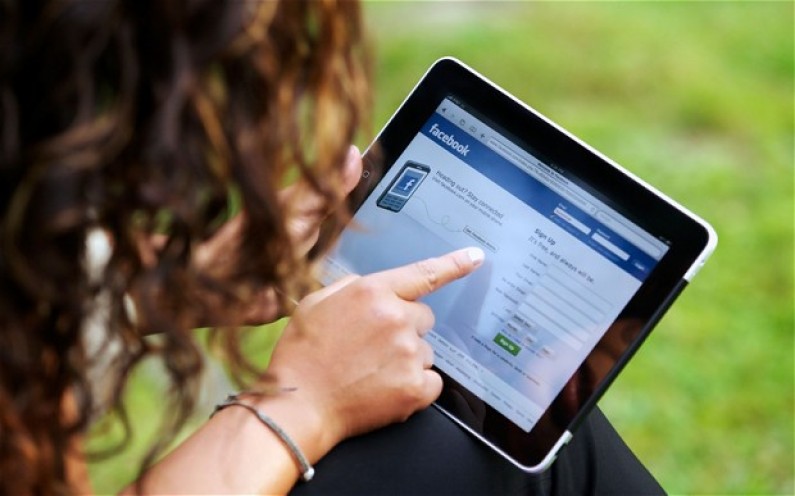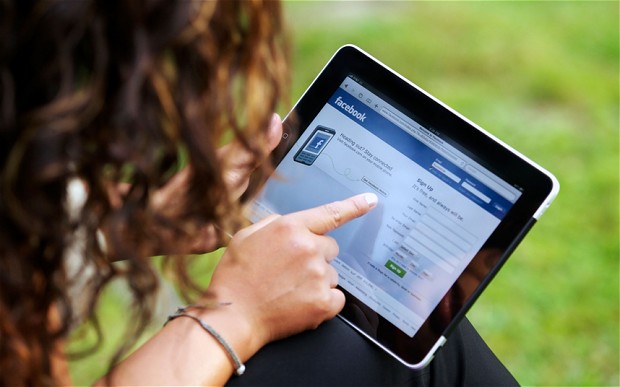

At 800 million users as of July 2011, Facebook has solidified its presence in social communication and is often referred to as a officiator of interpersonal connections. It’s not a new phenomenon-the need to legitimize oneself socially has been around since man learned how to paint Ug loves Lug on his cave wall. People want to be seen, heard, and validated.
The only difference now is social validation is no longer contained within small intimate settings but has gone public, viral and can be summed up in a series of wall posts, status updates and friend requests. Facebook is the new cave wall. “Facebook is pushing itself to be your conduit of communication,” H.L. Gillis, head of Georgia College’s psychology department, said. “It just depends on what’s your influence for being marketed to.” For many college students, this influence is fairly high. Few can imagine modern communication without Facebook and those who refuse to engage in the site can be viewed as social piranha.
“I think it weird,” Nicole Lekas, a Junior Public Relations major said. “I think they’re like in the witness protection program or something. I mean my mom has a Facebook and she doesn’t even know how to work a computer.” Founded in 2004, this social juggernaut began as a networking site for college students and professors. As the site expanded to incorporate more groups and organizations, its importance in modern communication increased with it. With 800 million users as of July 2011 and growing popularity in countries such as Ghana, Facebook has cemented its position as the medium for social connection.
Much of the site’s success can be attributed to its incorporation of features that already existed within social media presented in a simplistic format. “Facebook has just made it really easy to make your own webpage,” Gillis said. “You don’t have to have code or make it pretty. Facebook just makes it really accessible.”
This concept of accessibility is Facebook’s claim to fame. By creating a profile, users make a particular persona and are able to access millions of other personas. In the process, users allow Facebook and reinforce their relationships through comments, status updates and the implementation of features such as the like button. “I abuse the like button,” Jessica Haymon, Junior Print major, said. “I like a lot of things.” Haymon, a self-proclaimed Facebook addict, uses the site to maintain established personal connections with her sorority, friends, and family as well as foster new relationships.
“When I went to the fair, there was this running joke that we would find a lumberjack and strap him to the car,” Haymon said. “When we got there, there was one very handsome lumberjack named Briton. That night, I ‘Facebooked’ him and we’ve been texting ever since.” Haymon is not alone in using Facebook to scope out potential mates. Sara Mooradian, junior Biology major, admits that she has added guys that she did not know but that she found attractive. “I’ll add a hot guy, a really hot guy,” Mooradian said. “And actually, one of the hot guys I added I became really good friends with.”
Facebook’s significance within social communication allows it to become a medium of authority. For users such as Haymon and Mooradian, the profiles they discovered online could be trusted because Facebook is legitimate medium for personal interactions. This concept is discussed in an American Association of Behavorial and Social Sciences article that focuses on how Facebook plays a role in validating interpersonal relationships. In other words, what is said and done on the site is legitimized. It is “Facebook official.”
This term is most often used when referring to romantic relationships. The act of having or not having a relationship status can lend insight to how an individual views their relationship and their concepts of privacy. Brett Osborne, Junior Psychology major sees no harm in displaying his relationship status and is a natural step for him with his relationships. “If I have a girlfriend it’s going to be someone I’m proud to be with,” Osborne said. “And it’s my friends on my Facebook so they’ll probably already know.”
For Mooradian, who chooses to keep her relationship status hidden, feels that broadcasting this information to the Facebook world is unnecessary and is no one else’s business aside from herself and her partner. “I’m too old for that,” Mooradian said. “My close friends would know, so it wouldn’t even matter.”
Others simply update their status if their mate decides to first. Mike Augustine, Senior Community Health major explains that he often leaves the decision up to the girl. “I’m not quick to do it,” Augustine said. “But if the girl starts it then you can’t really say no.” Osborne takes a similar stance when it comes to break ups. “When you break up with someone it’s so awkward,” Osborne said. “It’s like am I going to do it? Is she going to do it? Eventually, you kind of just go for it.”
Aside from the tension that can be caused through one’s status, relationships can also be affected by the information that can be found on Facebook. Jared Holmes, Senior Community Health major experienced relationship tension regarding a picture on his profile. “I had a picture of me and another girl on my Facebook,” Holmes said. “We were just friends, but one my exes saw it and got mad. There was an argument, but when worked it out…we did break up eventually.”
A 2011 study conducted by the Journal of Computer-Mediated Communication examines this idea of jealousy and how social media, particularly Facebook, contributes to prevalence of this feeling within relationships. The findings largely supported that although the higher level of access to a partner’s activity can increase jealousy, it only affects those who already sensitive to relationship instability. Facebook simply solidifies the issue, working as the officiator.
With so many of our interactions being made official through Facebook, offline interactions can lose some of their legitimacy. This effect on face-to-face interactions is a definite concern for Osborne, who prefers in person communication over internet. “You have this illusory sense of being with people when you’re alone,” Osborne said. “So when you are with people, its value has been degraded because you feel you always are connected…you’re not in the moment with them.”
There is also a greater opportunity for miscommunication which can lead to strain or confusion with personal relationships. Gillis emphasized the need for clarity when using social media such as Facebook, and that users need to be wary of what they decide to publicize.
Despite the possible negative ramifications of relying on Facebook to validate social interactions, Gillis argues that overall, Facebook fosters a sense of community that previously did not exist. “I think all social networking sites have done is provide this ability to set up different circles, communities in one medium,” Gillis said. “It’s all about connections.”
Blog By Noelle Brooks


